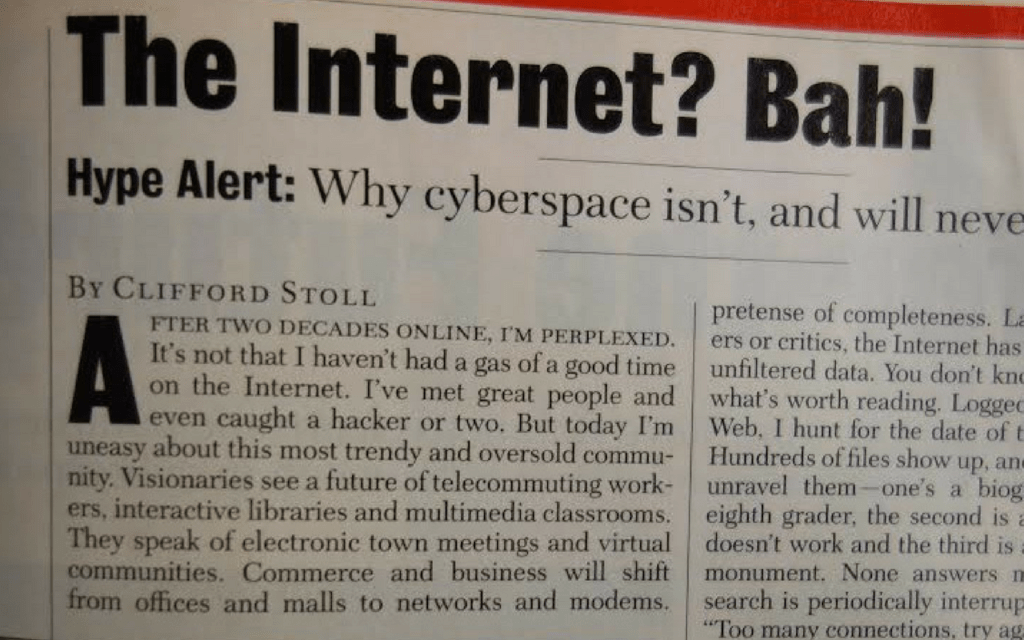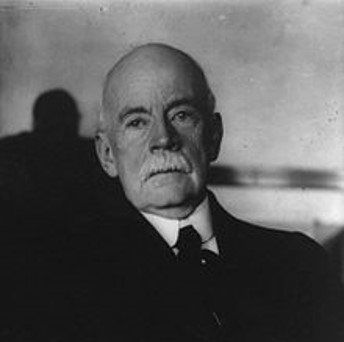
We love predictions. It’s always exciting when the year ends to tune into futurists and other soothsayers in an effort to learn what’s next. The problem is, no one is ever held accountable for their wrong-headed prognostications.
You have to really be off the mark for society to remember your ridiculous ideas. And in fact, one of the dumbest actually occurred not all that long ago.
The culprit was scientist Clifford Stoll, and unfortunately for him, he occupied a rather big and influential stage when he made his ill-fated remarks.
At the time, Stoll wrote for Newsweek (which would stop publishing a physical magazine in 2011 in favor an online magazine). NewStatesman’s Amelia Tait reported Stoll’s vision of the Internet’s future was fantastically wrong:
“The truth is no online database will replace your daily newspaper, no CD-ROM can take the place of a competent teacher and no computer network will change the way government works.”
But here’s my favorite: Stoll’s quote that compared the Internet to a very popular gadget back in the ’90s – CB radio:
“(On the Internet) every voice is heard. The cacophony more closely resembles citizens band radio, complete with handles, harassment, and anonymous threats. When most everyone shouts, few listen.”

Newsweek still makes the article available, archived online here.
Journalist Tait reminds us Stoll was far from the only pundit who got it totally wrong. The inventor of Ethernet, Robert Metcalfe, gave the Internet about a year before its implosion:
“I predict the Internet will soon go spectacularly supernova and in 1996 catastrophically collapse.”
And global investor Waring Partridge had this to say about the worldwide web back in 1995 after reading an analysis that stated most Internet users were online without any instruction:
“Most things that succeed don’t require retraining 250 million people.”
So there.
Lots of harrumphing and scoffing about the innovation that has only changed the world during the last quarter century.
But these guys weren’t alone. Consider the esteemed Charles Holland Duell (pictured below right), born in 1850 who went on to become the U.S. Commissioner of Patents late in the 19th century. During his tenure there – roughly 120 years ago – Mr. Duell is credited with having this to say about the future of innovation:
there – roughly 120 years ago – Mr. Duell is credited with having this to say about the future of innovation:
“Everything that can be invented has been invented.”
That’s the silliest notion of all when you consider the amazing mechanical leaps, as well as the speed at which technology has rocked the world.
And that brings me to a recent story in Inc. by Bill Murphy, Jr – “An American Airlines Executive Had a Brilliant Idea. It Changed Passengers’ Lives Forever.”
Murphy’s tale focused on Thomas Plaskett, an American Airlines marketing exec. Plaskett didn’t invent something out of thin air. In fact, he took American Airlines already existing system, turned it on its side and reinvented it.
Plaskett’s amazing innovation: the world’s first frequent flyer program, was created four decades ago – even before there was an Internet.
Plaskett’s reinvented system became a marketing godsend – miles/points that would drive sales and loyalty, not just for American, but for businesses and brands all over the world.
 American’s program has the same name Plaskett dubbed it back then: AAdvantage.
American’s program has the same name Plaskett dubbed it back then: AAdvantage.
It is the gift that keep on giving, helping all of us to reimagine how we market and brand.
Plaskett explained to The New York Times back in 1982, “We are attempting to build brand loyalty in a commodity market.”
That sounds a great deal like what audio platforms – radio stations, podcasts, streams – are trying to accomplish right now.
By inventing the frequent flyer program, Plaskett created his own currency that has become “cash” for credit cards an other financial instruments. American’s program generates more than $1 billion annually in partnership with banks. The other airlines have similar deals in place.
financial instruments. American’s program generates more than $1 billion annually in partnership with banks. The other airlines have similar deals in place.
Plaskett recently passed away, but his legacy is that it is indeed possible to take an existing product, technology, or even medium, and look at it through a different prism.
In the same way, Amazon Prime, Netflix, Spotify, SiriusXM, and scores of others have created the “subscription economy,” broadcast radio would do well to re-examine its model, and iterate from there.
 That light bulb can go off at any time and a big idea could be hatched out of the production studio, a sales cubicle, or the traffic director’s office.
That light bulb can go off at any time and a big idea could be hatched out of the production studio, a sales cubicle, or the traffic director’s office.
In every brainstorming session I’ve been in, participants are encouraged to “think outside the box.” But like Tom Plaskett, there’s much to be said for staying inside the box to reinvent an existing product in a way that just might revolutionize an entire industry.
Or the world.
A special thank-you to Andy Bloom who’s always dreaming and scheming.
- What To Do If Your Radio Station Goes Through A Midlife Crisis - April 25, 2025
- A 2020 Lesson?It Could All Be Gone In A Flash - April 24, 2025
- How AI Can Give Radio Personalities More…PERSONALITY - April 23, 2025




Stoll was right about the cacophony where everyone shouts and nobody listens.
You’re right, Thom. He nailed that part.
With tongue only slightly in cheek.
The future is local – like Farmer’s Markets. Staff sourced from within a ninety minute drive from the studio.
Same for news and talk breaks. Remind Marge that it’s time to take the biscuits out of the oven; shout-out to seven-year-old Johhny who scored the winning goal/homerun last night. Do things that bigger outlets can’t won’t do.
That’s my prediction, which will no doubt come true the same time the patent office closes.
Paul, smart predictions all. Thanks fir commenting.
Full service stations were there as (this other wise) Paul described 40 years ago. The good ones dominated their markets.
But as more stations slowly (and some quickly) pulled their focus away from local to only national (topics and talent), listeners lost a big chunk of their sense of pride, knowledge, and identification with their own hometowns.
Public radio actually did much the same thing in the 1990’s and early aughts…filling their grids with the top distributors’ best shows and phasing out local. But because the national news and talent was compelling and authentic, so it gained audience on commercial outlets. Still Pub Radio was moving less local too.
Now all of them are recognizing the potential for the kind of local flavor the Paul has described. Public radio is trying to lead on re-building local – news / talent. Terrestrial commercial might do well to follow suit.
It might take awhile to retrain the audience what’s so friggin’ great about that. Patience has never been the strong suit of commercial radio.
Paul, thanks for the delineation between commercial and public sectors. You’re one of the few who know how both work from experience. I believe the concept of robust local service has eluded them both. And I’m not sure there are many proponents on both sides of the aisle who agree about the value of local. You are correct that many public stations are considering the value of reflecting the local ethos, but the network programming still dominates their schedules. Appreciate you weighing in.
I saw Stoll speak at the Dayton Hamvention in the 1980s, in the wake of his first boo, “The Cuckoo’s Egg” about how he caught hackers in the pre-WWW internet world. He was a very entertaining speaker. When “Silicon Snake Oil” came out, one of the comments he said in an interview indicated that work wouldn’t be able to be done from home because of the need to have meetings. Well……there was 2020. In the posted article, he mentions the plethora of results from a search. That was true in the pre-Google years. Put a term into Yahoo Search and there were 10000 results, 9998 of them which were spam. I agree with the CB comment, he got that dead on.
It’s obviously not easy being the poster boy for getting the Internet wrong, Brad. Appreciate the content.
I was hoping that all my frustration with current commercial radio would bring forth a brilliant essay for this comment box. The medium has already been invented the job of making it something you want to hear is always on going and I think it would be helpful to stop replacing the mission to entertain with the word slick.
Thanks, Dan.